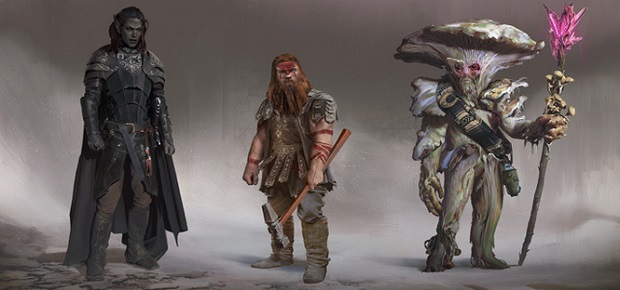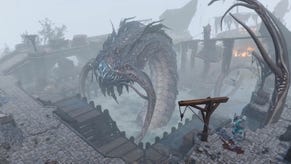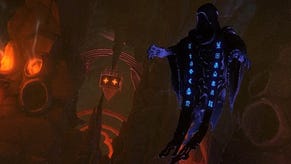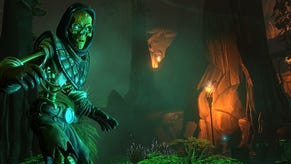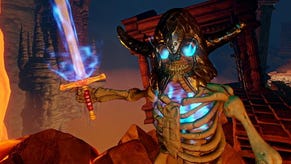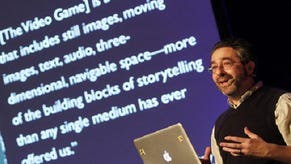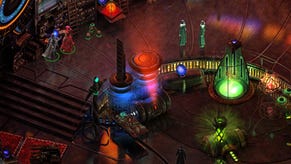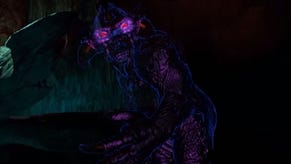Beyond Looking Glass: Underworld Ascendant Interview
Experimentation and improvisation
Underworld Ascendant [official site] has some big shoes to fill. Big shoes of Nostalgia +8. As a continuation of the Ultima Underworld series, with a team led by Looking Glass veteran Paul Neurath, Ascendant is picking up where the immersive first-person RPG left off a couple of decades ago. The game is currently well on its way to a $600,000 Kickstarter target and I spoke to Neurath about the project, and how it's possible to move forward while looking to the past.
“This isn't Looking Glass 2.0,” he says, even though Looking Glass 2.0 seems like a hell of a good thing to be. “We're not just looking back and trying to recreate something from the past. We're hoping to be part of the future.”
Neurath's new studio, OtherSide Entertainment, is home to several veterans of the Looking Glass years. It's worth noting that those years saw the creation of some of PC gaming's greatest hits, from the original Ultima Underworld (created under the moniker Blue Sky Productions) to the System Shock games, the two greatest Thief titles and Terra Nova. The studio's influence on the development of immersive sims continues to be felt, and not only through those alumni such as Harvey Smith and Ken Levine who have carved out careers in the first-person arena.
Looking Glass also played a strong role in shaping the expectations and hopes of gamers and critics of a certain age. When I suggested to Neurath that the promise of the nineties faded somewhat in the mass market of the last decade and a half, he disagreed.
“A game like Grand Theft Auto V would have been considered experimental because of its open world and sandbox gameplay. There's much more receptitivity toward those kind of experiences now.”
He did, however, acknowledge that the “player-authored” experience of a game like Underworld will never reach the mass market.
“RPGs can be demanding on the player. In Underworld, you're not playing a single character, not even a character like Garrett the thief, we give you freedom to approach scenarios however you choose to. We're not going to tell you how to play this game.”
Games that make demands of the player in that way don't necessarily reach the widest audience, which is why Neurath believes it would be a mistake to reach for an enormous budget. “If you're spending 50 million dollars you need to reach as many people as possible. You can't experiment.”
By their nature, Neurath argues, RPGs are about experimentation and improvisation. His understanding of the craft of roleplaying goes back to the earliest days of Dungeons & Dragons, when the creators of tabletop systems would send out mimeographed maps to players. Through the Wisconsin roleplaying scene of the mid-seventies, Neurath encountered Dave Arneson, and the close-knit nature of that formative environment is something that he reckons online communities and crowdfunding can recapture, to an extent.
More importantly, he thinks that CRPGs still have a lot to learn from pen and paper roleplaying. The character sheet, the avatar and the player's intellect and personality are tools with which to overcome challenges, and those challenges should offer a diverse range of solutions. Rather than performing a poor imitation of a human Dungeon Master, a computer can provide systems that encourage emergent play, allowing unscripted situations to develop. In Underworld Ascendant, as an extension of the original Underworld games, many of the dynamic situations will be symptoms of the faction system. As Neurath describes how it'll work, I get the impression it's the aspect of Underworld that he's been redesigning and elaborating on for twenty years or so.
“In the original Underowrlds there were some lighweight faction elements. Player could interact and befriend one group – becoming enemies of another group. It was fairly primitive stuff, with AIs interacting in fairly limited ways. We're really pushing that aspect.
Creatures have their own agendas. At first the player may be mystified by the world but once you get beyond that you'll slip into the politics of the factions. There are three main factions with much deeper dynamics between them. The player has to choose which faction to join with at some point in the game. That has deep repercussions.”
The systems driving AI behaviour in Ultima Underworld may have been “fairly primitive” but clever design goes some way toward disguising crude mechanics. Given that at least some of the inspirations for Ascendant are decades old, pre-digital games and interactions, I wonder how much technology influences design. Is a well-designed game a well-designed game forever, and how do technological advances help to communicate elements of that design?
“Technology certainly helps, but good design doesn't depend on it.” Advances in tech help designers in ways that aren't necessarily noticeable in the end product though. Building custom engines took a great deal of work and now, with Unity, all of the baseline elements are already in place. It's easier to test mechanics early in the development process, iterating on design rather than waiting for the engine to be in a robust state that supports experimentation.
“In the original Ultima Underworld, we were frustrated that we couldn't render a full screen. Now, the platform is so powerful that we can concentrate on what we're doing with it rather than putting effort into the most basic things.”
There's also the other aspect of technology, digital downloads and online feedback. “In the Looking Glass days, you worked on a game for a long time and hoped it was the right game, then you threw it over the retail fence and it was done. Now, we don't have to work through publishers and the retail channel, we can distribute directly to the fans and take more creative risks.”
In a way, Neurath is turning the idea of Kickstarter as a modern phenomenon on its head during our conversation, indirectly likening the crowdfunding process and fan participation to those early exchanges of maps and rulesets in the RPG scene that grew out of tabletop wargaming societies.
Those early experiences are important to him, clearly, and the closest he comes to criticising the current output of the larger studios is telling. There's a tendency to borrow ideas from non-interactive media, whether that be books, films or television, while the social interaction of tabletop gaming is too often ignored. “Some AAA games lose the beauty of the interactive medium to hit a mass audience”, he says.
I question whether looking back to the nineties, and even the seventies, might be a mistake. Is there an inherent contradiction in attempting to recreate an experience that was innovative and ahead of its time?
“Part of the DNA of Underworld was looking way forward, and that DNA is alive and well. People can go and play them for the first time today, and once they get past the graphics, the gameplay still hasn't been exceeded in some cases.” He talks, briefly, about the development of Ultima Underworld 2, which was more of a 1.5 as many ideas were dropped in order to finish the game on time.
Some of those ideas will be picked up again now and they are ideas that haven't been fully expressed elsewhere. Despite his positivity about the gaming industry, Neurath acknowledges that progress can seem slow.
“I would never have imagined twenty years ago that the games industry wouldn't have moved forward so much. It feels like we're behind where we should be but remembering that we're only three decades in.
“There's plenty of space to grow and we'll be looking to do that, but the game will feel familiar to people who loved the originals. At its core, Ascendant is an immersive dungeon crawl. Just as the success of the latest edition of D&D shows, some things are perennial.”
Underworld Ascendant's Kickstarter is live.



